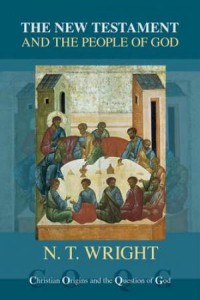
The work of N. T. Wright has become a defining marker for the thoughtful Christian. Whether that be as an exemplar of a supposed soteriological heresy, or as an expositor of a refreshingly dynamic eschatology, Wright is now a centre, a touchstone of theological thought. To go to The New Testament and the People of God, the first volume in Wright’s definitive multi-volume multi-decade opus Christian Origins and the Question of God, is therefore a valuable exercise. This volume lays the foundations.
The key to the volume is in the title. This book is about The New Testament as both literature and history. And it is about the People of God and the interwoven historical worldviews that both distort and reveal the depths and power of the Christian identity in this real world.
My own motivation in reading it stems from something of a working hypothesis: that the Jewish roots of Christian spirituality, articulated through the so-called New Perspectives framework in particular, are a solid base on which to construct an effective contemporary apologia. Which is to say: As a Christian community we need to explain (and defend) both how and why we follow Jesus, to an audience that is increasingly sceptical of both our explanation and our motivation; the language and ideas of Wright’s project are not simply helpful, but essential, to this task. To defend and disciple we must know who we are; and before we are grounded in ideas, we are grounded in history; before personal introspection, communal experience; and at the centre of that historical experience is a Jewish Messiah.
We need to do both history and theology: but how? Ultimately, the present project is part of the wider task— which I believe faces modern Western culture in its entirety, not only theologians or Christians— of trying to rethink a basic worldview in the face of the internal collapse of the one which has dominated the Western world for the last two centuries or so. (Kindle Location 960-962)
I think Wright can assist us in this task. But, in this volume in particular, we need to put the work in. This is a dense book. Even in ebook format, it is a weighty volume. Wright is laying foundations for his later volumes and all foundations are both heavy and precisely calculated. Here Wright is interested not only in telling us his thoughts, but justifying his thinking. This volume is therefore, in part, a philosophical treatise, arguing points of epistemology and historiography as much as communicating what he knows and how he knows it.
There is every danger that the reader could get lost in the trees and not see the beauty of Wright’s forest. To that end let me give a word to the wise: he does provide a map! It’s just that he gives it to you at the end, in the concluding “Part VI.”
Parts I and II are about philosophical fundamentals, an explanation of what he means by “worldview,” and hermeneutics:
I argued in Parts I and II of this book for a holistic reading of the New Testament that would retell its stories faithfully, that would allow its overtones as well as its fundamentals to be attended to. (Loc. 13750-13752)
…the New Testament can only properly be understood if we recognize that it is a collection of writings from precisely this community, the subversive community of a new would-be ‘people of god’. (Loc. 13758-13759)
It is not simply, like so many books, a guide for private spiritual advancement. To read it like that is like reading Shakespeare simply to pass an examination. The New Testament claims to be the subversive story of the creator and the world, and demands to be read as such. (Loc. 13799-13801)
Parts III and IV uses these tools to consider the overlapping and interlocking worldviews of God’s People in 1st Century Judaism and early Christianity.
We must ask: why did this Jewish sect, out of all the other groups and movements within the first century, develop in this way, so strikingly different from all others? And, whenever we approach the early Christian writings with this question, we have a strong sense that it was not simply a matter of the sect’s early corporate decisions, enthusiasm, shrewd planning or anything else. It was something to do with Jesus… Jesus stands between the two communities, living and working within that first-century Judaism which we mapped out in Part III, and being claimed as the starting-point of the community we mapped out in Part IV. (Loc. 13733-13742)
It is not possible in a short review to do justice to the detail. Moreover, it is the sort of detail that needs to be mulled over and digested; it’s impact sometimes only being noticed in hindsight as you find yourself cogitating on Scripture with different questions than normal, or frustrated by niggling misinterpretations and misapplications that could otherwise be avoided, or approaching a pastoral or ecclesial problem from a slightly different perspective. For my own benefit, if nothing else, I have included below something of an appendix with some snapshots and highlights.
What is certain is that this tome has emboldened and encouraged me in my project: to know and tell the story of the God who has moved definitively in this world, and certainly in history; the New Testament story that defines, shapes, and moves us as the people of God.
APPENDIX:
Preparatory Work (Parts I and II) – Epistemology, Hermeneutics and History
Wright’s epistemology is critical realism. He critiques enlightment positivism and phenomalism and asserts
Over against both of these positions, I propose a form of critical realism. This is a way of describing the process of ‘knowing’ that acknowledges the reality of the thing known, as something other than the knower (hence ‘realism’), while also fully acknowledging that the only access we have to this reality lies along the spiralling path of appropriate dialogue or conversation between the knower and the thing known (hence ‘critical’). (Loc. 1241-1244)
Critical realism paves the way for a consideration of worldview in terms of symbols and story, (“Human life… can be seen as grounded in and constituted by the implicit or explicit stories which humans tell themselves and one another.” Loc. 1302-1303), which provides the eventual connection point with Biblical content and the self-understanding of the people (“Our task, therefore, throughout this entire project, will involve the discernment and analysis, at one level or another, of first-century stories and their implications.” Loc. 2283-2284) . In short: Wright’s epistemological (and therefore hermeneutical) toolbox has us delving into narrative, but not in a disembodied sense. We examine narrative that is both in and of community.
History, then, is real knowledge, of a particular sort. It is arrived at, like all knowledge, by the spiral of epistemology, in which the story-telling human community launches enquiries, forms provisional judgments about which stories are likely to be successful in answering those enquiries, and then tests these judgments by further interaction with data. (Loc. 3114-3117)
This is the basis for Wright’s framework for distinguishing and describing worldview:
There are four things which worldviews characteristically do, in each of which the entire worldview can be glimpsed.
First… worldviews provide the stories through which human beings view reality. Narrative is the most characteristic expression of worldview, going deeper than the isolated observation or fragmented remark.
Second, from these stories one can in principle discover how to answer the basic questions that determine human existence: who are we, where are we, what is wrong, and what is the solution?
Third, the stories that express the worldview, and the answers which it provides to the questions of identity, environment, evil and eschatology, are expressed… in cultural symbols…
Fourth, worldviews include a praxis, a way-of-being-in-the-world.
(Loc. 3576-3598)
There is some application even at this base level: “in principle the whole point of Christianity is that it offers a story which is the story of the whole world. It is public truth. Otherwise it collapses into some version of Gnosticism.” (Loc. 1383-1385) In a postmodern world events, even objects, things, can be construed as embodied stories. Symbolism and narrative matters, connects the ancient to the now, and, most importantly, moves people. Understanding of narrative in worldview prevents talking at cross-purposes and avoids stalemate (see Loc. 3645). It aides apologetic.
Applying the Tools (Parts III & IV) – First Century Judaism and Early Christianity
These sections are all about applied critical-realism.
My aim is… not to project non-Jewish ideas on to Judaism, but to achieve a critical-realist reading of first-century Judaism, including its beliefs and aspirations, in its own terms, which will then shed unexpected light on the rise of Christianity. This, as I argued earlier, is what history is all about. (Loc. 4187-4189)
The object of the application is Wright’s wealth of historical knowledge. Taking us back to the exile he builds the narrative through the intertestamental period. He outlines political currents, the rise of the Jewish sects (Pharisees, Sadducees, Essenes), allowing each to contribute to the worldview-scape that comes together at the time of Jesus. There is too much to precis but Wright himself summarises:
Story, symbol and praxis, focused in their different ways on Israel’s scriptures, reveal a rich but basically simple worldview. We can summarize this in terms of the four questions which…are implicitly addressed in all worldviews.
1. Who are we? We are Israel, the chosen people of the creator god.
2. Where are we? We are in the holy Land, focused on the Temple; but, paradoxically, we are still in exile.
3. What is wrong? We have the wrong rulers: pagans on the one hand, compromised Jews on the other, or, halfway between, Herod and his family. We are all involved in a less-than-ideal situation.
4. What is the solution? Our god must act again to give us the true sort of rule, that is, his own kingship exercised through properly appointed officials (a true priesthood; possibly a true king); and in the mean time Israel must be faithful to his covenant charter. (Loc. 6872-6879).
Alongside the Jewish worldview, particularly at the point of it’s eschatology, Wright connects (juxtaposes?) a similar analysis of the early Christian worldview. His methodology is to consider the “kerygmatic” church at certain extra-biblical “fixed points” in it’s early history. This frustrates those who are keen for some biblical interpretation, but it is a necessary step which strengthens the historical/literary basis of later chapters (and New Perspectives exegesis in general). Beyond the crucifixion itself we are taken to the martyrdom of Polycarp, the correspondence of Pliny and other familiar primary sources. He summarises the defining narrative:
These events form a chain stretching across a century in which, time after time, the Roman authorities found the Christians (as they found the Jews) a social and political threat or nuisance, and took action against them. The Christians, meanwhile, do not seem to have taken refuge in the defence that they were merely a private club for the advancement of personal piety. They continued to proclaim their allegiance to a Christ who was a ‘king’ in a sense which precluded allegiance to Caesar, even if his kingdom was not to be conceived on the model of Caesar’s. This strange belief, so Jewish and yet so non-Jewish (since it led the Christians to defend no city, adhere to no Mosaic code, circumcise no male children) was, as we shall see, a central characteristic of the whole movement, and as such a vital key to its character. (Loc. 10373-10378)
The juxtaposition with Judaism is found in the basic questions. Compare this with the list I quoted earlier:
Who are we? We are a new group, a new movement, and yet not new, because we claim to be the true people of the god of Abraham, Isaac and Jacob, the creator of the world. We are the people for whom the creator god was preparing the way through his dealings with Israel…
Where are we? We are living in the world that was made by the god we worship, the world that does not yet acknowledge this true and only god. We are thus surrounded by neighbours who worship idols that are, at best, parodies of the truth, and who thus catch glimpses of reality but continually distort it. Humans in general remain in bondage to their own gods, who drag them into a variety of degrading and dehumanizing behaviour-patterns. As a result, we are persecuted, because we remind the present power-structures of what they dimly know, that there is a different way to be human, and that in the message of the true god concerning his son, Jesus, notice has been served on them that their own claim to absolute power is called into question.
What is wrong? The powers of paganism still rule the world, and from time to time even find their way into the church. Persecutions arise from outside, heresies and schisms from within…
What is the solution? Israel’s hope has been realized; the true god has acted decisively to defeat the pagan gods, and to create a new people, through whom he is to rescue the world from evil. This he has done through the true King, Jesus, the Jewish Messiah, in particular through his death and resurrection. The process of implementing this victory, by means of the same god continuing to act through his own spirit in his people, is not yet complete. One day the King will return to judge the world, and to set up a kingdom which is on a different level from the kingdoms of the present world order. When this happens those who have died as Christians will be raised to a new physical life. The present powers will be forced to acknowledge Jesus as Lord, and justice and peace will triumph at last. (Loc. 10804-10824, emphasis mine).
Finally, with his well-founded hermeneutical lens, he can consider the New Testament through a standard systemic consideration: the synoptics, Pauline writing, Johannine writings, and so forth. For instance,
All three synoptic gospels, we have seen, share a common pattern behind their wide divergences. All tell the story of Jesus, and especially that of his cross, not as an oddity, a one-off biography of strange doings, or a sudden irruption of divine power into history, but as the end of a much longer story, the story of Israel, which in turn is the focal point of the story of the creator and the world. (Loc. 11516-11519)
Slowly but surely it all comes together as Christian worldview is placed alongside and drawn out from the Jewish narrative. It is not simplistic considerations of propositional continuity and discontinuity, but fulfillment and development in the same narrative arc. Consider this snippet form his treatment of Paul [with its wonderful gem highlighting that “taking every thought captive” is not introspection but missional intellectualism!]
These major features of Paul’s theology only make sense within a large-scale retelling of the essentially Jewish story, seen now from the point of view of one who believes that the climactic moment has already arrived, and that the time to implement that great achievement is already present…. Because this story is the story of Israel understood as the story through which the creator god is restoring the creation, and with it the race of Adam and Eve, it addresses, confronts, and attempts to subvert the pagan world and its stories. We therefore often see Paul, as he says himself, ‘taking every thought captive to obey Christ’, meeting pagan ideas coming towards him and, like Jehu, bidding them turn around and ride in his train .(Loc. 11754-11768)
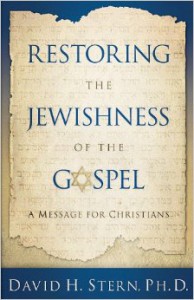 Given my appreciation of David Stern’s Complete Jewish Bible translation I was looking forward to a brisk read through his diminutive Restoring the Jewishness of the Gospel. I was a little disappointed.
Given my appreciation of David Stern’s Complete Jewish Bible translation I was looking forward to a brisk read through his diminutive Restoring the Jewishness of the Gospel. I was a little disappointed.
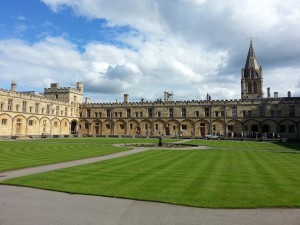
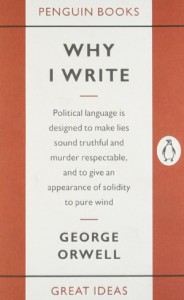 George Orwell is a touchstone of 20th Century literature, particularly political rhetoric. There are numerous commentators who have delved into the depths of classics such as Animal Farm. But when I finally got to reading (for the first time!) the definitive 1984 I thought I would go to Orwell himself to reveal his whys and wherefores.
George Orwell is a touchstone of 20th Century literature, particularly political rhetoric. There are numerous commentators who have delved into the depths of classics such as Animal Farm. But when I finally got to reading (for the first time!) the definitive 1984 I thought I would go to Orwell himself to reveal his whys and wherefores.


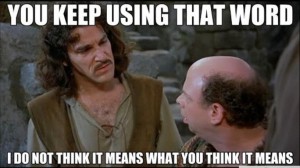 The conclusion
The conclusion

